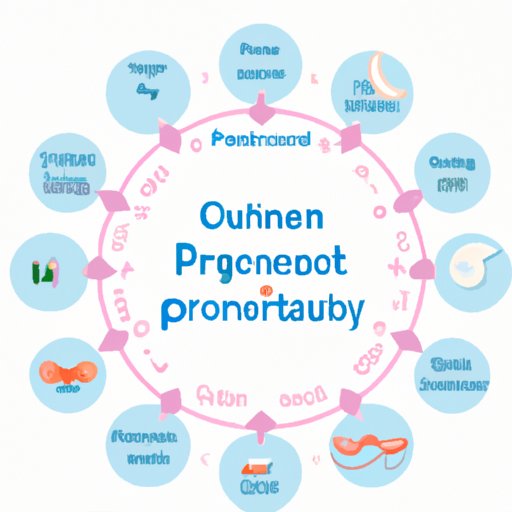
I. Introduction
Many women often wonder about the possibility of getting pregnant on their last day of period. Understanding your fertility and ovulation cycle is crucial in making informed decisions about birth control and family planning.
II. The Truth About Pregnancy Chances on Your Last Day of Period
Before discussing the possibility of pregnancy on the last day of your period, it’s important to understand the female reproductive cycle. The menstrual cycle is typically 28 days long, with ovulation occurring around day 14. During ovulation, an egg is released from the ovaries and travels down the fallopian tubes, where it can potentially be fertilized by sperm.
While the chance of getting pregnant during your period is low, it is not impossible. Sperm can survive in the female reproductive system for up to five days, meaning that if ovulation occurs within this window, pregnancy is possible. However, the likelihood of ovulation occurring during the last day of your period is quite rare.
It’s important to note that the chances of getting pregnant on your last day of period are significantly lower than during your fertile window.
Factors such as hormonal imbalances or irregular periods can affect the likelihood of getting pregnant during this time. It’s important to talk to your healthcare provider if you are experiencing any menstrual irregularities or fertility concerns.
III. Understanding Your Ovulation Cycle: Can You Get Pregnant on the Last Day of Your Period?
The key to understanding your ovulation cycle is to track your menstrual cycle. There are various methods to track ovulation, including using basal body temperature or cervical mucus monitoring. These methods can help determine when ovulation occurs and predict fertility.
The fertile window is the period of time during which pregnancy is most likely. This typically occurs five days before ovulation and one day after. This means that getting pregnant on your last day of period is unlikely, but not impossible.
On the other hand, the safe period refers to the time during the menstrual cycle when pregnancy is unlikely. This involves avoiding intercourse or using contraception during the potentially fertile days leading up to ovulation.
IV. Maximizing Your Fertility: Debunking the Myth About Getting Pregnant on Your Last Day of Period
There is a common myth that having sex on the last day of your period is a surefire way to prevent pregnancy. This is not entirely true, as pregnancy can occur during this time. However, there are lifestyle changes that can increase your chances of getting pregnant.
Eating a healthy diet, maintaining a healthy weight, and reducing stress can all contribute to improving fertility. Additionally, using ovulation tracking tools can help predict the most fertile days and increase the chances of conception.
If you have been trying to conceive for more than a year without success, it may be time to talk to your healthcare provider about possible fertility treatments or interventions.

V. Residual Risks: The Chances of Conception on the Last Day of Your Period
While the chances of getting pregnant on your last day of period are low, there are still residual risks associated with unprotected sex during the safe period. Sperm can survive in the female reproductive system for up to five days, meaning that if ovulation occurs during the safe period, pregnancy is still possible.
It’s important to note that there is also a risk of sexually transmitted infections (STIs) during unprotected sex. It’s important to use protection or communicate with your partner about their STI status to reduce the risk of transmission.
It’s crucial to practice safe sex and use contraception consistently to reduce the risk of unintended pregnancy and STIs.
VI. Navigating the Complexity of Female Reproduction: Getting Pregnant on Your Last Day of Period
Understanding female reproduction can be complex, and there are various factors that can affect fertility. Conditions such as endometriosis or polycystic ovary syndrome (PCOS) can significantly impact fertility and require specialized care and treatment.
If you are experiencing fertility concerns, it’s important to talk to your healthcare provider about potential causes and treatment options. They can provide tailored recommendations and treatment plans to increase your chances of conceiving.
VII. Timing is Everything: When Ovulation Can Occur on the Last Day of Period
While ovulation typically occurs around day 14 of the menstrual cycle, it’s important to note that this can vary between individuals. Ovulation can occur earlier or later in the cycle, meaning that the chances of getting pregnant on your last day of period can vary depending on your unique cycle.
It’s important to track your ovulation cycle and pay attention to any irregularities or changes in your menstrual cycle. This information can help you make informed decisions about contraception and family planning.
VIII. The Last Day of Period Conundrum: Exploring the Possibility of Pregnancy
While getting pregnant on your last day of period is unlikely, it’s crucial to weigh the risks and potential outcomes of unprotected sex during the safe period. Depending on your unique cycle and fertility, pregnancy is possible during this time.
It’s important to have open and honest communication with your partner about contraception and safe sex practices. There are various contraceptive methods available, including hormonal birth control and condoms, that can effectively reduce your risk of unintended pregnancy and STIs.
IX. Conclusion
Understanding your fertility and ovulation cycle is crucial in making informed decisions about family planning and contraception. While the chances of getting pregnant on your last day of period are low, it’s still important to practice safe sex and use contraception consistently to reduce the risk of unintended pregnancy and STIs.
If you are experiencing fertility concerns or have questions about your reproductive health, it’s important to talk to your healthcare provider. They can provide personalized recommendations and treatment plans to improve your chances of conceiving.




